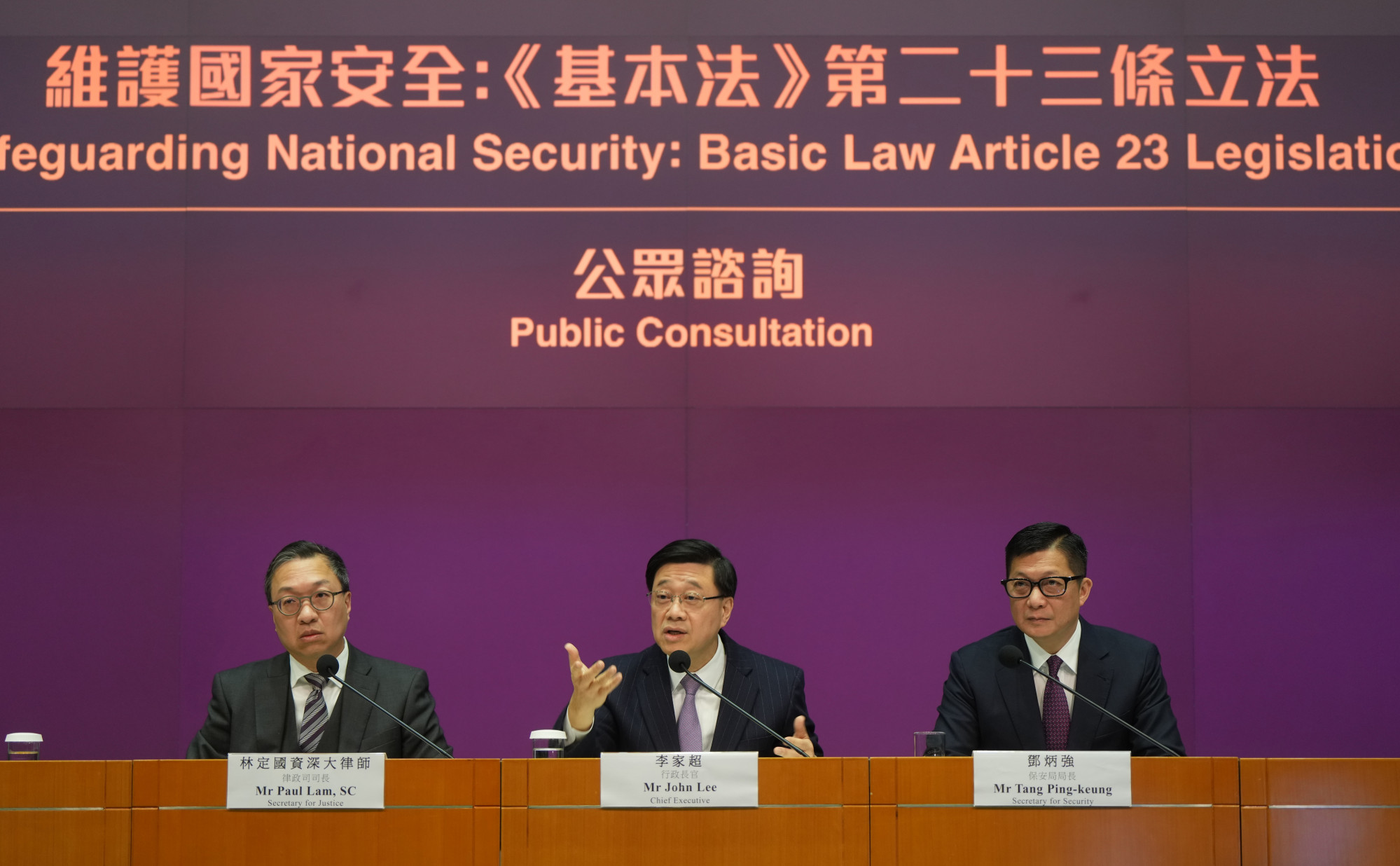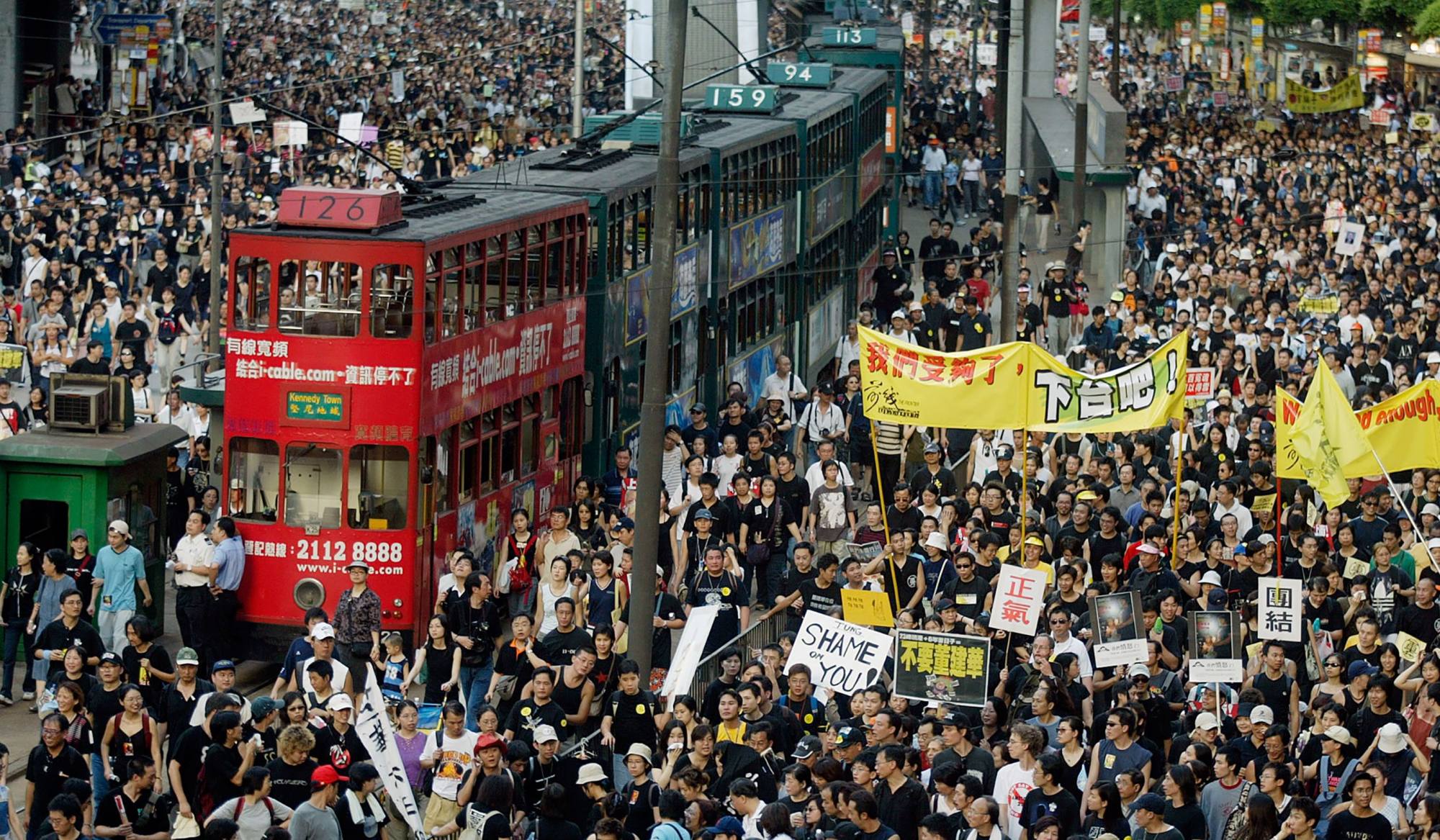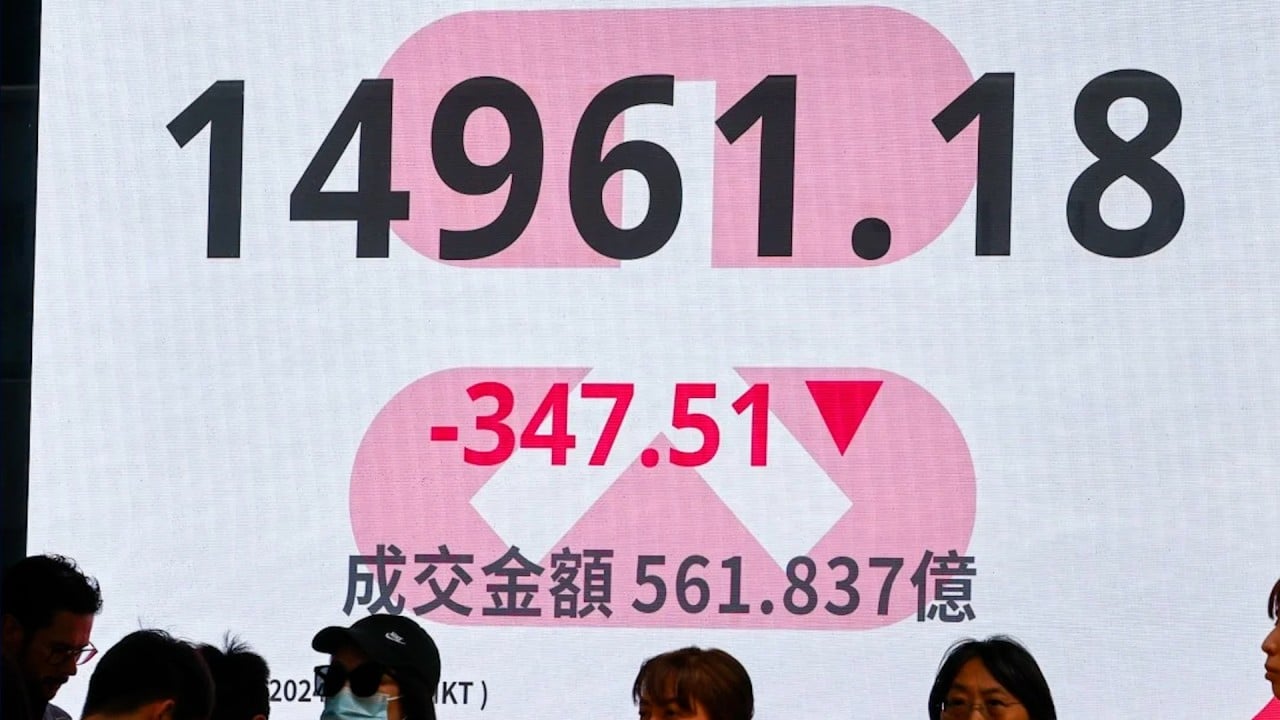
Hong Kong leader unveils details of domestic national security legislation required under Article 23
- Proposed law targets treason, insurrection, sabotage, foreign interference, theft of state secrets and espionage
- ‘The new law aims to create a stable and safe environment so that when people attack us, we will be protected,’ city leader John Lee says
Hong Kong’s leader has unveiled plans to enact sweeping domestic national security legislation targeting treason, insurrection, sabotage, foreign interference, theft of state secrets and espionage, promoting it as a “defensive law” to ward off attacks against the city amid escalating geopolitical tensions between China and the West.
“The new law aims to create a stable and safe environment so that when people attack us, we will be protected. This is a law to tell people not to attack us. It is, in a way, a defensive law,” Lee said.
“I hope people will see the law and know that they may try somewhere else rather than Hong Kong.”

Officials said law-abiding citizens would have nothing to fear, while they would be open to further discussing any need for exemptions based on public feedback.
It will be the city’s second attempt to enact the contentious legislation after the government’s last bid in 2003 sparked strong public opposition which forced the withdrawal of the bill.
While the consultation period this time is significantly shorter than the three months offered in the failed attempt more than two decades ago, the new Article 23 bill is expected to meet far less resistance.
Beijing has transformed the city’s political landscape after the anti-government protest chaos of 2019 to ensure that only those deemed as “patriots” are allowed to hold public office or join the legislature.
National security: what is Article 23 and why is it back in the spotlight?
According to the legislative framework of the Safeguarding National Security Ordinance spanning nine chapters, authorities will plug the remaining loopholes by amending several existing laws to expand their coverage and drawing up new ones for five types of offences: treason; insurrection or incitement to mutiny and disaffection alongside acts with seditious intentions; theft of state secrets and espionage; sabotage; and external interference. Authorities cited similar legislation in Britain and Canada as references.
To tackle treason, the government has proposed amending the Crimes Ordinance while codifying the existing offence of “misprision of treason” under common law.
The consultation paper makes repeated references to the months-long social unrest in 2019 to justify the need for the new legislation.
It proposes raising the penalties for the current offences of “seditious intention” and “possession of seditious publication” while naming “insurrection” as a new offence to deal with acts of serious civil disobedience within the country.
“The large-scale violence that occurred during the ‘black-clad violence’ in 2019 did endanger the public safety of the [city] as a whole and posed threats to national security,” the paper reads.
“But dealing with them by the offence of ‘riot’ under the Public Order Ordinance fails to adequately reflect, both in terms of criminality or the level of penalty, the nature of such violence in endangering national security.” Rioting carries a maximum sentence of 10 years in jail.
Similarly citing the vandalism and transport disruption seen during the 2019 protests, new offences listed in the bill will cover acts of sabotage or impairment of public infrastructure, as well as the unauthorised use of computer or electronic systems, with intent to endanger national security.
No businessmen want to see their investment … destroyed by violence or in a war zone
The Official Secrets Ordinance will be updated to cover seven types of “secrets”, including information about major policy decisions on national and local affairs, the economic, social, technological or scientific development of the country or city, and external affairs of Hong Kong and its relationship with Beijing.
The paper recommends introducing a new espionage offence to ban anyone from participating in, backing or receiving advantages from external intelligence organisations.
It also proposes a new external interference offence to target several acts, such as influencing the central and local governments in formulating or executing any policy, and interfering with the city’s elections and the work of the legislature in collaboration with outside forces.
The consultation paper recommends empowering the government to prohibit the operation of certain organisations on the grounds of safeguarding national security as well.
Human rights, arts causes can hide spying: Hong Kong security chief on Article 23
The domestic legislation would grant authorities “proportional” extraterritorial powers for some of the unspecified offences to target acts carried out by “ill-intentioned people outside the territory”, but Lee made it clear on Tuesday that defendants would not be sent to mainland China for trial, contrasting with the national security law which carries such a clause.
Authorities also spelled out plans to plug what they called inadequacies in handling national security cases currently, such as extending the detention period of arrestees to allow more time for police investigation, rolling out measures to stop absconders, and tightening the threshold for the early release of prisoners convicted of national security offences.
Lee insisted the one-month consultation period was “suitable” given the document had elaborated the legislative framework in detail.
He added that he, along with justice minister Paul Lam Ting-kwok and security chief Chris Tang Ping-keung, would further explain the new legislation to foreign diplomats and business chambers in the city. Town hall-style sessions would also be held to gauge public views, he promised.
“Surely, [foreign] organisations or enterprises will not like to operate in an area which is a war zone, or where there are conflicts. No businessmen want to see their investment and business disrupted or destroyed by violence or in a war zone,” Lee said.
The city’s leader said a backlash from China’s critics was to be expected, as he accused some countries of having “bad motives” and wanting to see Hong Kong defenceless.
“They will try to make your law weak, so that they can find loopholes to attack,” he said.
“Bad-mouthing and political attacks will continue. That is exactly why I want the government to be up and in full gear to explain what we are doing here, loud and clear, confidently and rightly, to tell the world we are just protecting ourselves from your attacks. Don’t attack us.”
In a separate briefing, justice minister Lam said the new legislation, similar to other criminal laws, would not have a retroactive effect, as he gave a public assurance that it would align with standards under international conventions to protect Hongkongers’ rights and freedoms, which he noted were not absolute.
Asked whether any exemptions would be allowed, such as for the media to report on information not otherwise made public, or whistle-blowers to leak information, security minister Tang said further discussion would be needed on whether “public interest” could be cited for exemption.
Hong Kong’s Article 23 ‘should define state secrets differently from mainland China’
Zheng Yanxiong, director of the central government’s liaison office in the city, said that enacting Article 23 was a manifestation of the traditional Chinese pursuit of territorial integrity and national safety.
A European Union spokesman said it could only make preliminary observations on the consultation paper at this stage, but stressed it was following the issue closely.
“The European Union (EU) has repeatedly made clear its grave concerns about the deterioration of Hong Kong’s high degree of autonomy and the use of the 2020 national security law,” he said, accusing local authorities of using the Beijing-imposed legislation “to crack down on pro-democracy forces, stifle dissent and pluralism, and erode fundamental freedoms”.
“The EU is concerned that some definitions and provisions in the proposed Article 23 legislation will equal the scope and the draconian measures of the national security law, or even go beyond those, and further weaken Hong Kong’s remaining freedoms.”
In stark contrast to the government’s previous drive on Article 23, all lawmakers issued a joint statement on Tuesday evening pledging to fully support the legislative work to ensure it would be passed as soon as possible. They also vowed to actively do their work in explaining the proposal to residents and the international community.
Four local leading chambers of commerce also said the legislation would strengthen the city’s business environment.
But Democratic Party chairman Lo Kin-hei said the government should further clarify how Hongkongers’ freedom and rights would be protected, expressing concerns that residents might fall prey to unclear laws.

Lo added the one-month consultation period, which includes the Lunar New Year holiday, was not sufficient for the public to understand and discuss the proposal, and he urged authorities to extend the period to three months.
“It’s crucial for the government to show that they are really listening and willing to communicate, even though their thoughts are very different, especially towards the national security risks that Hong Kong is facing,” he said.
Human rights lawyer Mark Daly said concerns remained over the broad definitions of sedition, state secrets and external influence, which might not comply with modern human rights principles.
“It is hoped that there will be a vigorous debate and that any comparative analysis with other jurisdictions will bring international expertise to the discussion,” he said.
Johannes Hack, president of the German Chamber of Commerce, said it would have to review the paper carefully to gauge its potential effects, but said there was concern that business’ stakeholders in Germany and Europe would perceive the legislation as moving Hong Kong closer to the mainland.
Additional reporting by Jess Ma, Connor Mycroft and Emily Hung


